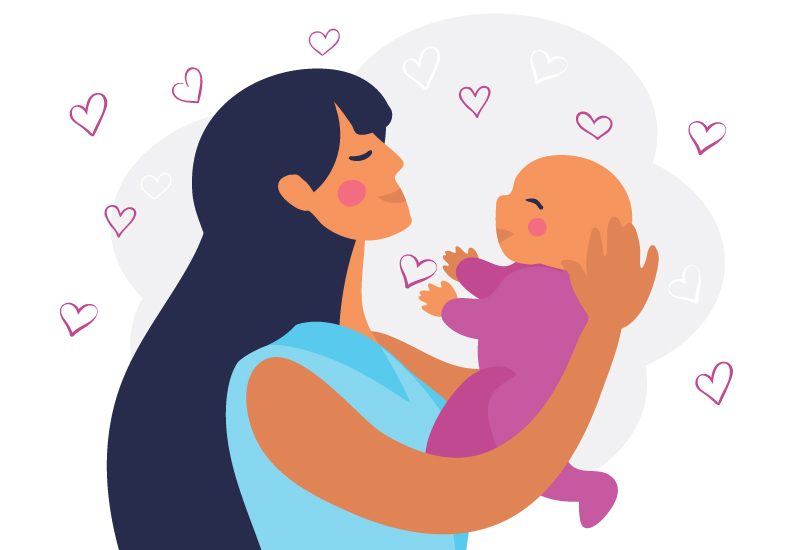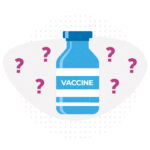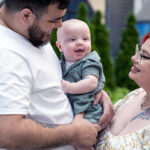Pregnant mothers who get COVID-19 vaccines are also protecting their babies

Recent studies have shown that COVID-19 vaccination is safe for expectant mothers and can protect them against infection, severe illness, and death from COVID-19. We also know that mothers vaccinated during pregnancy pass coronavirus antibodies to their babies. The latest research — drawing on 30 children’s hospitals in 22 states — now confirms that vaccinating pregnant mothers protects their babies from severe COVID-19.
Through the ongoing Overcoming COVID-19 public health investigation, run through Boston Children’s Hospital, the researchers identified 537 babies hospitalized with COVID-19 (181 during the Delta wave and 356 during the Omicron surge) and 512 babies who tested negative for COVID-19 and were hospitalized for other reasons. All the infants were under 6 months of age and were hospitalized between July 1, 2021 and March 8, 2022.
The research team then interviewed the infants’ families and checked vaccine registry records to determine the mothers’ vaccination status. They considered mothers to have been vaccinated if they had received two doses of the Moderna or Pfizer-BioNTech vaccine, with at least one of the doses given during pregnancy.
Overall, the study, published today in The New England Journal of Medicine, estimated that vaccination of pregnant mothers reduced the chances that their baby would be hospitalized with severe COVID-19 by 52 percent. It also found that:
- 84 percent of the babies hospitalized with COVID-19 were born to mothers who hadn’t been vaccinated.
- 21 percent were admitted to the intensive care unit (ICU).
- Admission to the ICU with COVID-19 was more likely among babies born to unvaccinated versus vaccinated mothers (23 vs. 13 percent).
- Vaccination appeared more effective in preventing infant hospitalization with COVID-19 when mothers were vaccinated later in pregnancy (after 20 weeks) versus earlier (69 vs. 38 percent effective).
To learn more, we sat down with Dr. Adrienne Randolph, a critical care physician at Boston Children’s. Dr. Randolph directs Overcoming COVID-19 and co-led the current investigation with researchers at the U.S. Centers for Disease Control and Prevention (CDC), which funded the study.
What is the main takeaway from this study?
Infants are among the groups at highest risk for complications from COVID-19. In this study, we showed that completion of COVID-19 vaccination during pregnancy was associated with a reduced risk for COVID-19 hospitalization among infants. We also showed that protection was higher when their mothers were vaccinated in the second half of pregnancy. Not only does vaccination protect mothers, it also helps to keep the baby safe from getting COVID-19.
One thing worth noting is that vaccination of pregnant mothers was less effective in preventing infant hospitalizations with Omicron. This is not surprising since we know Omicron has a greater ability to evade our antibody responses. Our earlier analysis, analyzing data through January 17, 2022, found a 61 percent efficacy against infant hospitalization with COVID-19. When we extended the study period to March 8, 2022, including more Omicron infections, this efficacy declined to 52 percent.
How sick were the babies who had COVID-19?
Many of them were severely ill. Of the 537 babies hospitalized with COVID-19, 113 (21 percent) were admitted to the ICU, and 64 babies (12 percent) were critically ill. Two infants passed away.
How did the timing of COVID-19 vaccination during pregnancy affect protection?
We compared infants of mothers who completed their second vaccine dose during the first 20 weeks of pregnancy versus the last 20 weeks (up to 14 days before birth). Vaccination later in pregnancy better protected the baby: it was 69 percent effective in preventing infant hospitalization with COVID-19 as compared with 38 percent when mothers were vaccinated in the first half of pregnancy.
But it’s important to remember that vaccination protects the mother, too. The CDC, the American College of Obstetricians and Gynecologists, and the Society for Maternal-Fetal Medicine recommend COVID-19 vaccination at any point in pregnancy. A healthy parent is important for a healthy baby.
What if I was vaccinated before pregnancy?
When we started our investigation, mothers were just starting to get vaccinated, so we didn’t have a large enough sample size to look at this. We are now doing so in a larger study.
Did the study say anything about COVID-19 booster shots during pregnancy?
Our study started in July 2021, and booster shots only started to be given in late fall 2021. So we did not have enough mothers receiving boosters to answer this question, but we hope to do so when we have more data.
Did the study look at the effects of breastfeeding?
We will need to do further studies to get a definitive answer about the potential protectiveness of breastfeeding. But we do know that mothers can transmit antibodies to the coronavirus to their babies through their breastmilk.
Is this study continuing?
We hope to continue this investigation for up to three more years to track infants hospitalized with COVID-19. We need to understand how booster shots and new SARS-CoV-2 variants influence the effectiveness of maternal vaccination in protecting young babies.
Learn more about COVID-19 research at Boston Children’s Hospital
Related Posts :
-

Model enables study of age-specific responses to COVID mRNA vaccines in a dish
mRNA vaccines clearly saved lives during the COVID-19 pandemic, but several studies suggest that older people had a somewhat reduced ...
-

Will people accept a fentanyl vaccine? Interviews draw thoughtful responses
In 2022, more than 100,000 people died from opioid overdoses in the U.S., according to the National Center for Health Statistics. ...
-

New insight into the effects of PPIs in children
Proton-pump inhibitors (PPIs) are frequently prescribed to suppress stomach acid in patients with gastroesophageal reflux disease (GERD). Prescribing rates of ...
-

Beyond expectations: Treating Isaac’s teratoma through an EXIT procedure
Jennifer worked as a hairdresser until just days before delivering her son, Isaac, last December, even though she had planned ...





